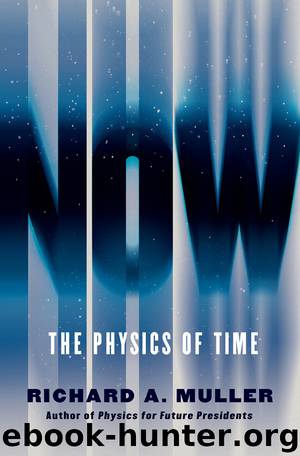Now by Richard A. Muller

Author:Richard A. Muller
Language: eng
Format: epub, mobi
Publisher: W. W. Norton & Company
Published: 2016-03-21T16:00:00+00:00
The Anthropic Arrow
Anthropic means “relating to humans.” The earliest use of the term recorded in the Oxford English Dictionary (1859) refers to the observations of gorillas and their humanlike behavior. The anthropic principle is beloved by many present-day theorists, particularly in string theory. It states that we can determine the parameters of the universe, such as its age and size and makeup, and maybe even the direction of time, by the fact that only a very narrow range of possibilities could lead to intelligent life.
According to the anthropic principle, the very fact that we are thinking about the origin of the universe today could only happen if our universe was a very special one. I think, therefore I am, and moreover, that means time must move forward and not backward. Hawking says the anthropic principle is so powerful that it even determines why our psychological arrow of time points in the same direction as the entropy arrow. If it didn’t, he states, we wouldn’t be discussing the issue. QED.
I personally regard the anthropic principle as useless. In my experience, it is used as an excuse by physicists who have failed at computing something, so they argue that things must be the way they are because otherwise we wouldn’t be here discussing the issue. Such reasoning depends on the assumption that any form of intelligent life must be very similar to our own. Time must go forward because reality would be different if it went backward.
A colleague of mine, Holger Müller (no relation that we know of) suggested an example that illustrates the emptiness of the anthropic principle. Imagine scientists pondering, “Why does the sun exist?” The anthropic answer would be: “Because if it didn’t, we wouldn’t be here!” That’s a simplistic answer that might have come from eighteenth-century philosophers. The much more fulfilling and rewarding answer has come from physics: A cloud of debris that was left over from a prior supernova explosion self-gravitated. As the pieces fell in, their velocity of motion and gravitational compression turned into heat, raising the temperature enough to ignite thermonuclear reactions. And so on. That’s the kind of answer that fits into the paradigm of science, well beyond the hollow approach of the anthropic principle.
In the early 1900s, Wolfgang Pauli, one of the founders of quantum theory, was shown a paper that he considered sloppy and confused. He is purported to have said that the work “was not even wrong.” In his mind, one of the virtues of a scientific theory is that it could be falsified; the theory he was shown failed to meet this criterion. Peter Woit, a mathematical physicist at Columbia, has argued eloquently that the anthropic principle (as well as string theory) also fits Pauli’s measure of being “not even wrong.” He lays out this argument in his blog and book, both titled (naturally) Not Even Wrong. In my mind, the expression not even wrong equally describes the entropy explanation for the arrow of time.
Download
This site does not store any files on its server. We only index and link to content provided by other sites. Please contact the content providers to delete copyright contents if any and email us, we'll remove relevant links or contents immediately.
The Complete Stick Figure Physics Tutorials by Allen Sarah(6638)
Secrets of Antigravity Propulsion: Tesla, UFOs, and Classified Aerospace Technology by Ph.D. Paul A. Laviolette(3448)
Thing Explainer by Randall Munroe(3327)
The River of Consciousness by Oliver Sacks(2992)
The Order of Time by Carlo Rovelli(2714)
I Live in the Future & Here's How It Works by Nick Bilton(2524)
How To by Randall Munroe(2474)
A Brief History of Time by Stephen Hawking(2473)
The Great Unknown by Marcus du Sautoy(2186)
What If?: Serious Scientific Answers to Absurd Hypothetical Questions by Randall Munroe(2170)
Blockchain: Ultimate Step By Step Guide To Understanding Blockchain Technology, Bitcoin Creation, and the future of Money (Novice to Expert) by Keizer Söze(2137)
Midnight in Chernobyl by Adam Higginbotham(2078)
Networks: An Introduction by Newman Mark(1998)
The Meaning of it All by Richard Feynman(1909)
Easy Electronics by Charles Platt(1864)
The Tao of Physics by Fritjof Capra(1848)
When by Daniel H Pink(1777)
Midnight in Chernobyl: The Untold Story of the World's Greatest Nuclear Disaster by Adam Higginbotham(1775)
Introducing Relativity by Bruce Bassett(1754)
